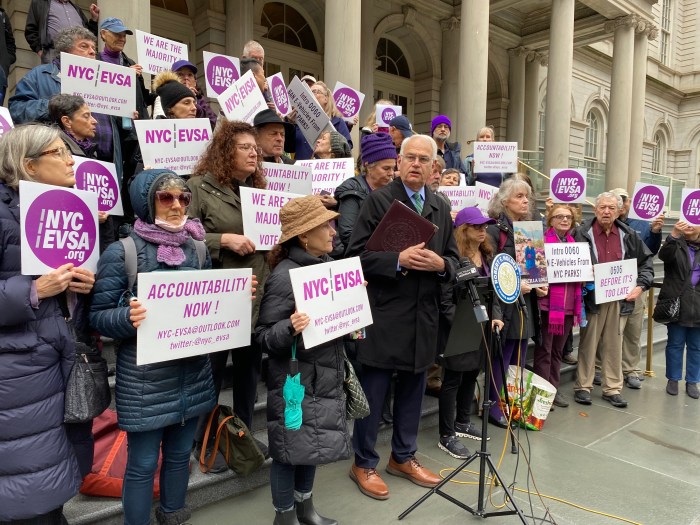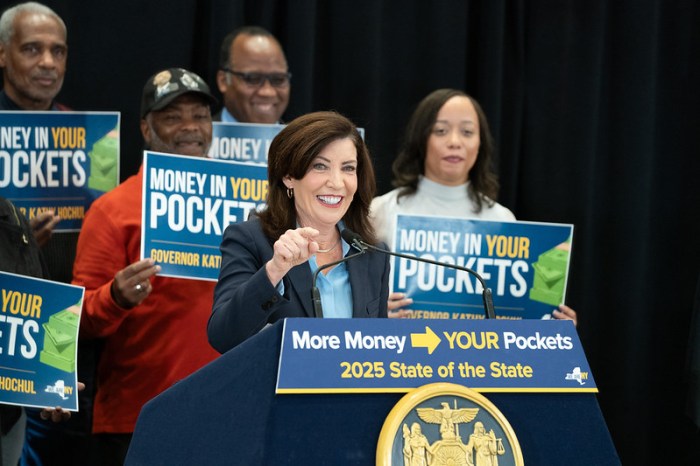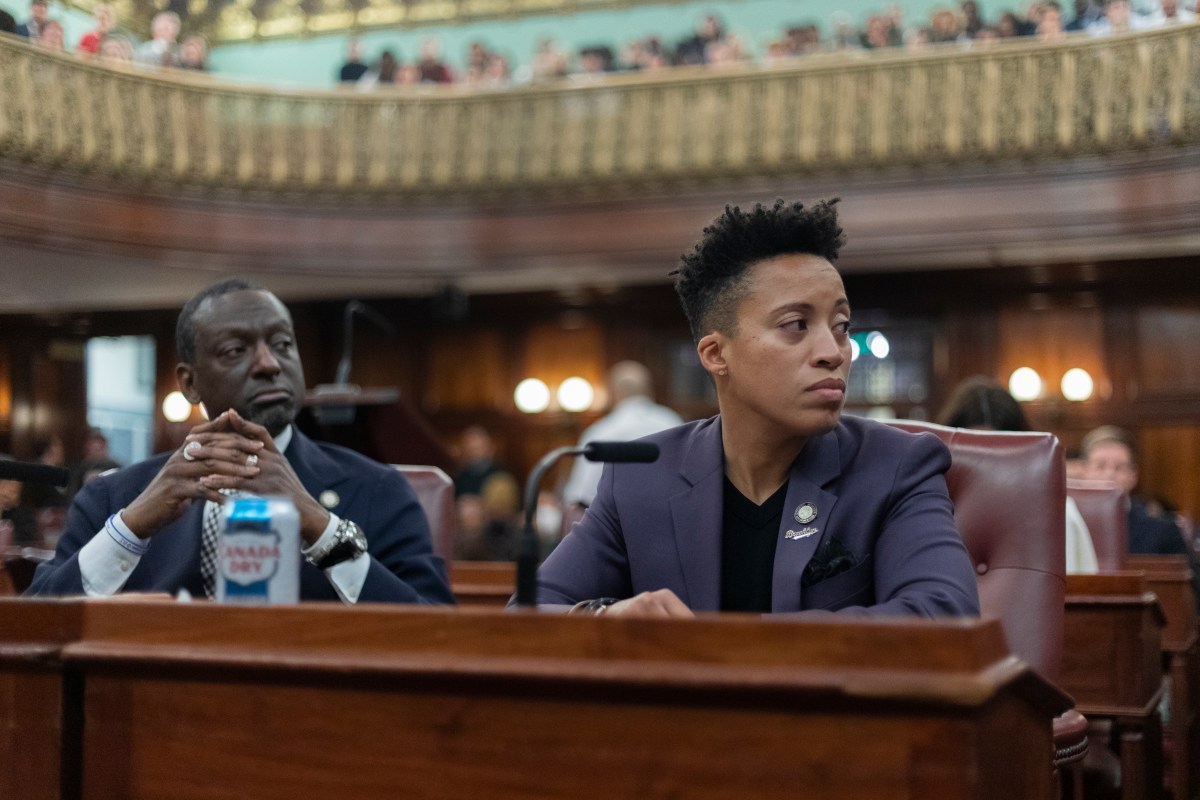Nothing seemed unusual about George Santos’ election to Congress until The New York Times dropped a bombshell story in December alleging that Santos lied to voters about the most basic things regarding his background: where he went to school, where he worked, his personal finances and his family history.
A week later — and a little over a month after defeating Democratic rival Robert Zimmerman in November 2022 for the Third Congressional District seat covering northeast Queens and northern Nassau County — Santos ultimately admitted to fabricating much of his backstory. Despite that admission of guilt, he refused to step down — even as deceived constituents seethed, and disappointed colleagues shunned him on the House floor.
The Santos scandal shook the foundations of New York politics in two ways. First, the breathtaking scope of Santos’ lies, and his refusal to hold himself accountable to voters, was unprecedented in the history of local politics. And second, it exposed incredible flaws in how candidates are vetted by both the parties and the local media.
The situation brings to mind the Russian proverb “trust, but verify” — a maxim that President Ronald Reagan was fond of using during his term in the White House, especially during summits with then-Soviet Union Premier Mikhail Gorbachev. The proverb suggests that someone’s word be taken at face value, though one would be wise to check that they’re telling the truth.
Only when it came to George Santos, too many institutions either trusted Santos’ word (after all, why on earth would someone lie about the most basic details of their life story?) or couldn’t immediately verify the information he provided.
What went wrong? And what must happen to avoid having another George Santos emerge in New York politics again, from either side of the aisle?
Opposition research’s importance

Alyssa Cass, a New York-based political consultant with Slingshot Strategies, which ran Congress member Pat Ryan’s (D-Dutchess/Ulster/Orange Counties) successful campaign, said the best way to conduct effective opposition research — a compilation of negative information about an opponent that can feed potential lines of attack — is to hire an outside researcher who will both dig up dirt on an opponent and weave said dirt into a damning narrative.
“There’s two types of books,” Cass said. “There’s one that is compiled strategically, focuses on stories most likely to garner media interest, and does the leg of connecting the dots, and really looks into any clues. In [what has been reported] about the George Santos example, if it says, ‘He claims to have an [animal rescue nonprofit], but we can’t find it,’ the best opposition researchers would work with the campaign to run that down. With less sophisticated or resourced researchers, you see that they had a lot of these pieces there, but failed to investigate further or connect the dots.”
Campaigns will typically give the dirt dug up through the opposition research process to journalists, who then use it as fodder for a reported story.
Opposition research is an essential part of any successful candidate’s media strategy, Cass said. It’s become increasingly important as social media continues to play an outsize role in promoting candidates for public office because negative stories about an opponent are more likely to catch voters’ attention than those that focus on subjects like a candidates’ policy agenda.
“Given that so much politics and the narrative is happening on social media, the negative on the opponent is increasingly important, in order to sort of meet the media moment and evolution of where and how politics are covered on Twitter,” Cass said.
“The very best campaigns understand that dynamic and prioritize opposition research,” she added. They “put it as a must do, in the same way they prioritize TV spending, or mail spending, or hiring a consultant like me. Those are, I think, some of the campaigns that you saw in this cycle be most successful.”
‘We trusted him’
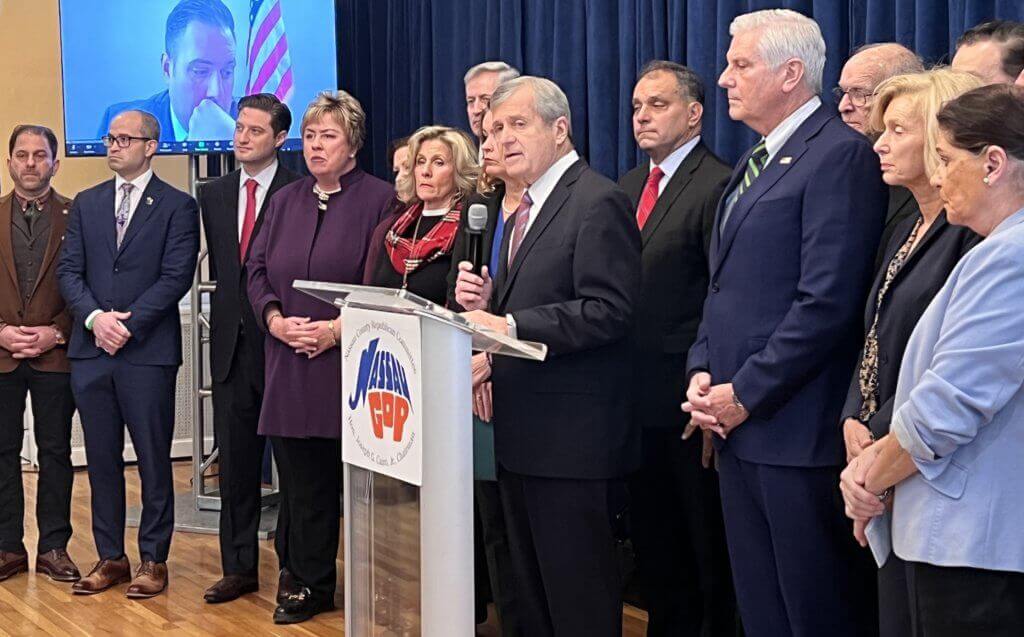
The first line of defense for verifying the quality of candidates for elected office are the political parties’ internal interview process during which hopefuls make their case for nomination, well before opposing candidates’ opposition researchers try to dig up dirt on competitors.
But Nassau County Republican Committee representatives say the ad-hoc committee of five to seven GOP officials that interviewed Santos in 2020 when he first ran against then-U.S. Rep. Tom Suozzi (D-Glen Cove) relied upon the recommendation of the Queens GOP.
“We do put a degree of reliance on the home community from which the candidate hails,” said Michael Deery, a spokesman for the Nassau GOP.
The Queens Republican leader conceded that the party did not independently verify the claims Santos made about background that the congressman now admits were lies.
“We ask, ‘What do you believe are the principles of the Republican Party?’” said Queens County GOP Chairman Tony Nunziato, who was not the party leader when Santos was interviewed in 2020. “You don’t ask what your grandfather did or where you worked; that’s like total interrogation. You don’t ask someone if you’re heterosexual or gay … We make sure that [candidate] believes in the party’s beliefs, not whether [their] mother was part of the Holocaust.”
Nunziato downplayed the investigations into Santos’ finances and the congressman admitting he lied about his background as the Queens Republican leader said he would not join calls for Santos to resign. Nassau Republicans, however, accepted blame for not more thoroughly vetting Santos while calling for his resignation.
During a news conference in which GOP party leaders and lawmakers called on Santos to resign on Jan. 11, Nassau Republican Committee Chairman Joe Cairo was confronted with questions about how exactly the party failed to properly vet Santos. Cairo noted that the Queens GOP’s recommendation of Santos was an unenthusiastic one.
“We trusted him, and I take responsibility for that,” Cairo told reporters. “When you ask a candidate questions, you expect them to be honest. He gave us a resume in writing of his credentials, his educational background, where he lived, his business background, etcetera. There was no reason to question it.”
Asked who specifically was on the Nassau GOP’s ad-hoc committee, Deery said neither he nor Cairo could recall names and there is no record of who participated in the party’s interview with Santos. All they know is that neither Deery nor Cairo were in the room for the Santos interview. It is also unclear who interviewed Santos for the Queens GOP.
GOP officials noted that when Santos was first interviewed by the party in 2020, there were not many Republicans lining up to challenge Suozzi, widely seen as a popular congressman expected to easily win re-election.
“The Democrats had a strong district, a strong incumbent, and people were not knocking down the door to run [on the Republican line],” Cairo said.
Cairo and Deery now say that the Nassau GOP is planning to revamp its vetting process to avoid the unprecedented embarrassment of having the party nominate a serial liar. What those reforms will look like remains to be seen, Deery said.
Democratic research
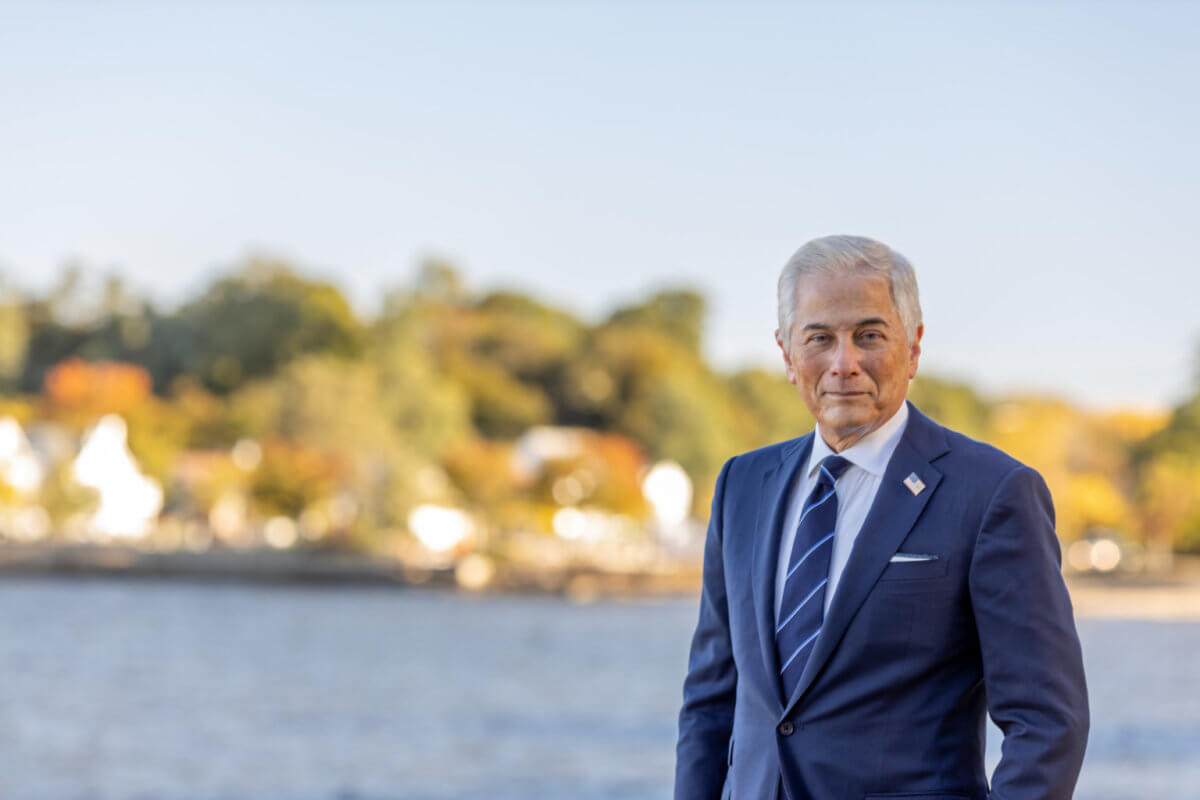
Robert Zimmerman, the Democratic nominee who faced off against Santos, released a statement on Dec. 19 shortly after the original New York Times article broke. In that statement, Zimmerman said he wasn’t surprised by the allegations.
According to Zimmerman, his campaign had been calling out Santos for these lies for several months. However, without any concrete evidence or confirmations from reputable news sources, these allegations did not gain much traction.
“The reality is Santos flat-out lied to the voters of NY-3,” Zimmerman said. “He’s violated the public trust to win office and does not deserve to represent Long Island and Queens.”
According to Zimmerman and Tanbir Chowdhury, the campaign manager for Reema Rasool when she ran against Zimmerman in the Democratic primary, an 87-page memo was made public by the Democratic Congressional Campaign Committee. The memo compiled research that suggested Santos either fabricated or hid many unsavory details about his past.
That 87-page memo was one of several “books” — reports compiling opposition research — that the DCCC assembles on Republican challengers each election cycle, according to a New York-based political consultant who’s worked on many local campaigns and spoke to amNewYork Metro on background.
“They’ve put together these briefings on potential candidates, all the Democratic candidates, people who are running in Republican primaries,” the consultant said. “They really do a ton of work to produce these research briefings on over 100 people across the country. So it’s certainly not incumbent on the DCCC to completely and thoroughly produce the most refined research products. That’s where a consultant comes in. But they do the starting point documents.”
The book compiled by the DCCC did contain some of Santos’ fabrications that were later made public in the New York Times’ initial investigation published in December.
For instance, the memo mentioned that the animal rescue nonprofit — Friends Of Pets United — Santos claimed to have founded and worked at, appeared not to be registered with the Internal Revenue Service (IRS). It also highlighted that Santos’ former employer, Harbor City Capital — where he worked as the New York Regional Director from 2020 to 2021 — was accused by the Securities and Exchange Commission (SEC) of running a $17 million Ponzi Scheme shortly after he departed the firm.
While Zimmerman said he went on to bring up much of what was mentioned in the report during the election, he said his campaign highlighted the findings that were most provable.
Zimmerman’s campaign declined to hire an outside consultant to chase down some of the report’s more salacious findings, he said, because he had just won a bruising late August Democratic primary and only had 10 1/2 weeks until the November general election to build a new campaign war chest. Not having the funds to chase down many of the memo’s leads itself, Zimmerman said his campaign flagged several of the findings to local investigative reporters, some of whom were able to write about them.
“On Aug. 24, 10 1/2 weeks to election day, we had to build the campaign from scratch,” Zimmerman said. “So we took the opposition research that was done. And we did what every campaign does with opposition research: you take it to members of the media and try to hopefully get them to focus on it. And in fact, some of our local media in Nassau County did.”
Zimmerman said the memo was made available for many media outlets, but several of those his campaign team approached on the topic didn’t prioritize the reports, opting instead to focus on marquee contests like the governor’s race.
The memo constituted the first opposition research to be conducted on Santos during either of his successive runs for Congress in 2020 and 2022, Zimmerman said. The area’s former Congress member, Tom Suozzi, declined to conduct opposition research on Santos in 2020 because he was an incumbent who had little chance of being unseated by Santos’ far smaller campaign in a swing district that leaned Democratic.
What comes next?
Political consultant Hank Sheinkopf told amNewYork Metro that to prevent future candidates who lie so extensively about their credentials from getting elected, political parties must take a more active role in vetting their candidates.
“To prevent a George Santos, you’d have to have much more active credential checks by functioning political parties,” Sheinkopf said. “It’s not there right now. Why? It’s not that they don’t function. It would appear as if they were engaging in a behavior that’s not necessarily normal, telling people they can run.”
Sheinkopf said political parties shy away from running deeper background checks on potential candidates for a couple of reasons: one, it would be admitting that members of their party are engaging in fraudulent behavior; and two, they’d be opening themselves up potential accusations of discrimination by candidates who are turned away.
They would be “taking a hit that some of their members, or some people who may identify as Democrats or Republicans, depending upon the case, are frankly frauds,” he said. “That becomes public and makes each of the parties look terrible. So they’re kind of in a jackpot. Damned if they do, damned if they don’t.”
In an effort to prevent a future George Santos from getting elected, Congress members Dan Goldman (D-Manhattan/Brooklyn) and Ritchie Torres (D-Bronx) introduced a bill last week called the “SANTOS Act” that would require those running for Congress to disclose their education, work and military service histories under oath.
Sheinkopf, however, said he doesn’t think the bill is an effective solution.
“How does that stand up that you’re asking people to effectively invalidate themselves?” he asked. “It’s complicated. It’s not so simple. And passing a law that says that they have to swear under penalty of perjury, for example, that they’re not lying, it’s hard to see how that holds up.”
Read more: NYC Hospitals Seek Funds for Permanent Nurse Hiring




